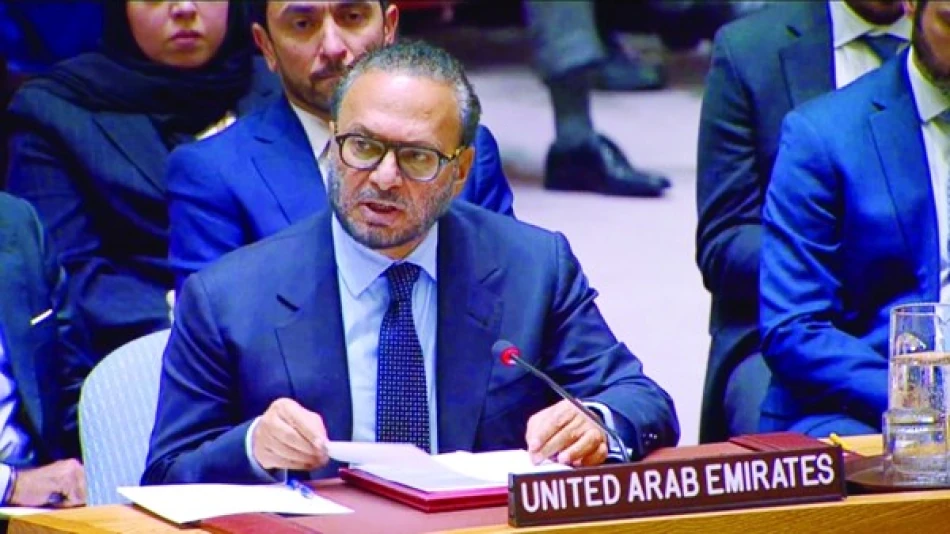
UAE Condemns Israel's Reckless Aggression, Rejects Claims of Peace and Security
UAE Condemns Israeli Attack on Qatar as Regional Security Crisis Deepens
The United Arab Emirates has summoned Israel's deputy ambassador and delivered a sharp rebuke over recent Israeli attacks on Qatar, marking a significant diplomatic escalation that threatens to unravel Middle Eastern stability. The move underscores growing Gulf unity against Israeli aggression and highlights Qatar's critical role as a peace mediator in the Gaza conflict.
Diplomatic Confrontation Signals Shifting Regional Dynamics
UAE Minister of State for International Cooperation Reem bint Ibrahim Al Hashemy summoned Israeli Deputy Ambassador David Ehud Horsandi to formally condemn what she termed a "blatant and cowardly" Israeli assault on Qatar. The diplomatic demarche represents one of the strongest rebukes from the UAE toward Israel since the Abraham Accords normalized relations in 2020.
The UAE's position reflects a broader recalibration of Gulf priorities, where regional solidarity increasingly trumps individual diplomatic arrangements with Israel. This shift mirrors similar tensions seen when other Abraham Accords signatories have criticized Israeli policies while maintaining formal diplomatic ties.
Gulf Security Architecture Under Pressure
Al Hashemy emphasized that Qatar's security forms an integral part of Gulf Cooperation Council stability, declaring that "any attack on a Gulf state represents an attack on the shared Gulf security system." This language echoes NATO's Article 5 collective defense principle, suggesting the Gulf states are moving toward more unified security responses.
The statement carries particular weight given the UAE's previous conflicts with Qatar, including the 2017-2021 blockade. The current UAE defense of Qatar demonstrates how external threats can rapidly reshape intra-Gulf dynamics, similar to how European unity strengthened following Russia's invasion of Ukraine.
UN Security Council Intervention Reveals International Stakes
Dr. Anwar Gargash, diplomatic advisor to the UAE president, addressed an emergency UN Security Council session, warning that continued inaction against Israeli violations would have "dire consequences for regional and international peace." His intervention signals the UAE's growing willingness to challenge Israeli actions in international forums despite bilateral diplomatic relations.
The Security Council's unanimous support for Qatar's sovereignty represents a rare moment of international consensus on Middle Eastern issues. This unity contrasts sharply with the typical deadlock that characterizes UN responses to Israeli-Palestinian conflicts, suggesting the Qatar situation has crossed traditional geopolitical red lines.
Mediation Role Creates Strategic Vulnerability
Gargash highlighted Qatar's crucial role alongside Egypt and the United States in Gaza ceasefire negotiations, arguing that attacks on Qatar "seriously undermine prospects for peace and ending the war in Gaza." This framing positions Israeli actions not just as sovereignty violations, but as direct sabotage of peace processes.
Qatar's mediation capacity stems from its unique relationships with both Hamas and Western powers, making it irreplaceable in current diplomatic efforts. Israeli attacks on Qatar therefore risk eliminating one of the few remaining channels for de-escalation, potentially extending the Gaza conflict indefinitely.
Strategic Implications for Regional Order
The crisis reveals fundamental tensions between Israel's expanding military assertiveness and Gulf states' vision of regional stability. Unlike previous Israeli operations focused on Palestinian territories or traditional adversaries like Iran, targeting Qatar directly challenges Gulf sovereignty in unprecedented ways.
For investors and regional businesses, this escalation introduces new uncertainty into Gulf markets that have positioned themselves as stable alternatives to traditional Middle Eastern volatility. The diplomatic crisis could complicate trade relationships and investment flows, particularly in sectors involving Israeli technology partnerships that have flourished since the Abraham Accords.
Testing Abraham Accords Resilience
The UAE's strong condemnation while maintaining diplomatic relations with Israel demonstrates the complex balancing act facing Abraham Accords signatories. Unlike complete diplomatic breaks, this approach allows continued engagement while establishing clear boundaries around acceptable Israeli behavior.
This model could influence other regional powers navigating relationships with Israel, suggesting that normalization agreements may evolve into more conditional partnerships rather than the unconditional support Israel traditionally expected from allies. The precedent established here may reshape how Middle Eastern states approach future Israeli actions, creating new constraints on Israeli military operations beyond traditional adversaries.
Most Viewed News

 Layla Al Mansoori
Layla Al Mansoori






